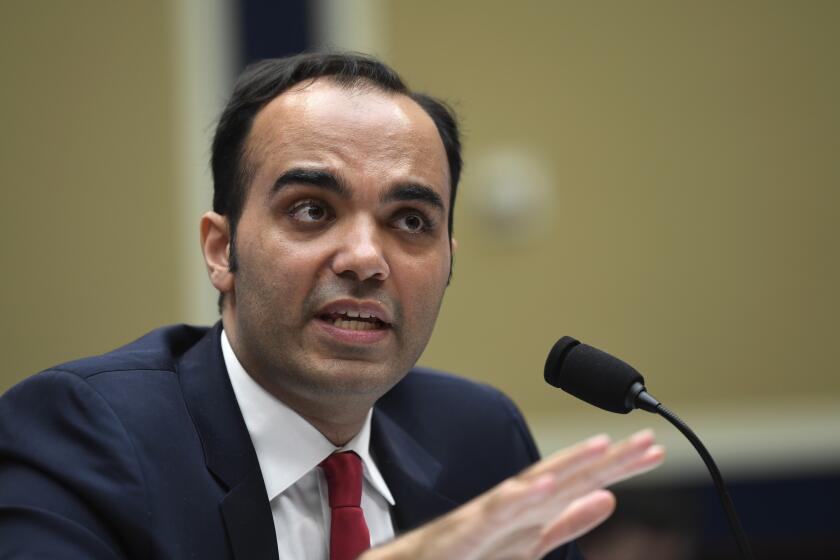Column: The war on ‘junk fees’ is gaining ground, but the fight is not yet won

- Share via
“I talk to a lot of banks,” Rep. Dan Meuser (R-Pa.) told Rohit Chopra, director of the Consumer Financial Protection Bureau, “and they’re really not happy with your agency.”
He urged Chopra to “be responsive to the clientele you’re supposed to be helping.”
With admirable restraint, Chopra replied: “Just to be clear, the clientele of the CFPB is not the banks. The clientele is the public.”
Consumers are fed up with hidden fees for everything from booking hotels and resort fees to buying concert tickets online, renting an apartment, and paying utility bills.
— Federal Trade Commission
The exchange occurred at a hearing of the House Committee on Financial Services on June 14. Leaving aside that Wall Street banks and brokerages have been among Meuser’s leading campaign donors, the congressman was not lying about the bankers’ opinion about Chopra and his agency — in fact, he may have minimized their hostility.
The U.S. Chamber of Commerce, speaking on behalf of the financial services industry, has called Chopra a “radical” pursuing an “ideologically driven agenda.” Last year, the American Bankers Assn. and two other bankers’ lobby groups published a 21-page broadside against him, calling on Congress and the federal courts to rein him in.
Get the latest from Michael Hiltzik
Commentary on economics and more from a Pulitzer Prize winner.
You may occasionally receive promotional content from the Los Angeles Times.
Their ire has intensified in recent months, as the CFPB has stepped up its campaign against “junk fees.” The agency defines these as excessive or unnecessary fees on overdrafts, account information requests, late payments on loans or credit cards, among other charges.
The CFPB’s campaign is part of the Biden administration’s broader attack on junk fees across the U.S. economy — fees that appear on a consumer’s bill at the end of a transaction, rather than being disclosed in advance.
If you’ve rented a car, bought an airline ticket, booked a hotel room or paid a cable bill, you probably know what the White House is talking about: hidden, surprise charges for services you may not even have used, transaction charges for buying online or downloading a concert ticket instead of picking it up at the box office, etc., etc.
These charges have proliferated as retailers and service providers try to raise revenues by “unbundling” services that used to be provided at no extra charge. The quintessential example comes from the airline industry, where baggage fees have soared, reaching nearly $6.8 billion last year among the top domestic carriers, up from $464 million in 2007. Some ostensibly low-cost airlines charge for checked bags and carry-ons.
The banking industry hates Consumer Financial Protection Bureau Director Rohit Chopra because he’s on the side of banking customers.
Biden took aim at the nickel-and-diming of American consumers within six months of taking office in 2021, when he instructed agencies including the Department of Transportation, Federal Trade Commission and Federal Communications Commission to devote close scrutiny to regulated industries’ treatment of consumers.
The administration intensified its campaign on Oct. 11, when Biden, FTC Chair Lina Khan and Chopra jointly announced new initiatives on junk fees.
The FTC’s proposed rule would require businesses to disclose “all mandatory fees when telling consumers a price, making it easier for consumers to comparison shop for the lowest price,” according to a commission statement. The FTC would be empowered to obtain refunds for consumers and impose financial penalties on businesses that don’t comply.
“Consumers are fed up with hidden fees for everything from booking hotels and resort fees to buying concert tickets online, renting an apartment, and paying utility bills ... leaving consumers wondering what they are paying for or if they are getting anything at all for the fee charged,” the statement said.
A couple of weeks later, the White House targeted another source of hidden fees — unrepairable products that force owners to pay for servicing by authorized shops — by convening a roundtable on the “right to repair.”
The administration was building on state initiatives in New York, Colorado, Minnesota and California, where a new law going into effect next July 1 requires manufacturers to provide documentation, parts and tools to consumers and repair shops on reasonable terms for any appliances or electronic devices made after July 1, 2021.
As I’ve reported, Apple has long been the worst of bad actors in selling devices that can’t be repaired by users; it began to come around in 2021, when it allowed iPhone users to perform the simplest fixes of broken screens and exhausted batteries. But it’s been backsliding: Owners of its newest desktop and laptop computers can’t even replace or upgrade their internal memory cards.
A proposed model law could rein in some of corporate America’s bad behavior toward consumers.
Government pressure on banks to reduce their junk fees has borne fruit, to an extent. At a hearing of the Senate Banking Committee on Wednesday, several bank CEOs testified about their institutions’ determination to reduce or even eliminate overdraft charges. That’s a fee category that long has been an irritant to customers, especially lower-income depositors, and has been a particular target of the CFPB.
JPMorgan Chase Chief Executive Jamie Dimon, for example, told the committee that his bank had introduced “low-cost, no-minimum balance, no-overdraft accounts specifically designed for the unique needs of lower-income and historically underbanked consumers.” He said overdraft fees at JPM Chase had declined by about 50% since before the pandemic.
That’s true as far as it goes — extrapolating from the bank’s nine-month totals, overdraft fees at JPMorgan Chase are on pace to total about $1.11 billion this year, down from $2.06 billion in 2019. More generally, however, JPM’s consumer banking fees have been sticky — they’re on pace to reach about $4.6 billion this year, compared with $5.12 billion in 2019.
Wells Fargo CEO Charles W. Scharf testified that his bank had “announced a number of changes ... to help millions of customers avoid overdraft fees.” Indeed, Wells Fargo is on pace to collect $908 million in overdraft fees this year, down from its $1.7 billion in 2019. But the total of all its consumer fees still is on pace to reach $4.1 billion this year, compared with $5.2 billion in 2019.
Nor are all reforms of overdraft fees equal. Some banks that boast of having eliminated overdraft fees, for instance, do so by enrolling their customers in services through which they’ll cover your bills but charge usurious interest rates for the excess.
The banks’ quarterly and annual reports to the consortium of federal bank regulatory agencies, however, document their difficulty in weaning themselves from those fees and others levied on consumers.
No one suggests that the banks shouldn’t charge fees for specific services, such as for maintaining customers’ checking or banking accounts or overdrawing their accounts or stopping payment on checks. The question is whether the fees reflect the costs of those services or incorporate an overly robust profit. It’s that hidden profiteering that often puts the “junk” in “junk fees.”
Does it really cost a bank $10 to process a checking overdraft? That’s Bank of America’s fee, according to CEO Brian Moynihan, who bragged that it has been reduced from $35. Does it really cost Bank of America $30 to process a stop-payment request, its fee for that service?
After years of refusing its customers’ demands, Apple says you can now repair your own iPhones — but there are limits
One reason these charges are pegged so high is to discourage customers from using those services, but an institution that really values its customers, as all the banks say they do, might think twice about using unnecessary charges to manipulate its clientele into avoiding services they can only get at a bank.
The CFPB is also tangling with the banking sector over an initiative it has launched to clamp down on credit card late fees (perhaps another reason that banks are “not happy” with the agency, to cite Meuser’s gripe).
The bureau has proposed to cap late fees at $8 per missed payment and in no case higher than 25% of the account’s required minimum payment. Under current law, credit card issuers can charge up to $30 for the first late payment and $41 for subsequent late payments — even if they’re a few hours or a day late. As many consumers learn from bitter experience, it’s not unusual for the late charge to exceed what was owed in the first place.
The CFPB calculates that credit card companies extract $12 billion a year from Americans through those charges, not counting the finance charges on unpaid balances; it says its proposal could reduce the toll by as much as $9 billion annually.
The bankers have ginned up an argument that the proposed cap will “ultimately harm all cardholders — whether they pay late, on time or carry a balance,” as Dimon put it to the Senate committee. He said he was quoting from the CFPB’s own findings, but that’s not exactly the point the bureau made.
What it said was that cardholders who carry a balance may be hit with higher interest rates or other fees, but of course that would be the card companies just trying to pump up charges that already are arguably excessive to make up for their losses in late fees.
(The average interest rate on credit card balances was 24.56% in November; the average charge-off of credit card balances among the 100 biggest banks was about 3.57% in the third quarter, which suggests that the banks would still be making gobs of money from credit cards at a much lower rate.)
For the bankers to warn that reducing one fee would force them to raise others is tantamount to their announcing that they’re determined to play an eternal game of whack-a-mole.
The fact is that junk fees permeate the economic landscape. Consumers are on the front line, but they face a tough battle, because junk fees are likeliest to crop up where they can’t easily be avoided. If you have a critical need to change your flight, refusing to pay an airline’s $100 change fee won’t get you where you need to go; it will just leave you earthbound.
That’s why the efforts of the Biden White House and its agencies are so important. Legislation and regulation are the best and fairest ways to eradicate junk fees. But don’t expect that to get very far without an intense backlash from the airlines, banks, hotels and other enterprises for which exorbitant fees for modest services have become mother’s milk.
More to Read
Get the latest from Michael Hiltzik
Commentary on economics and more from a Pulitzer Prize winner.
You may occasionally receive promotional content from the Los Angeles Times.













